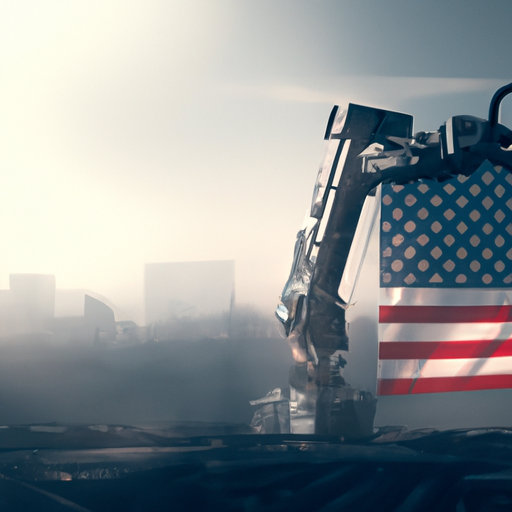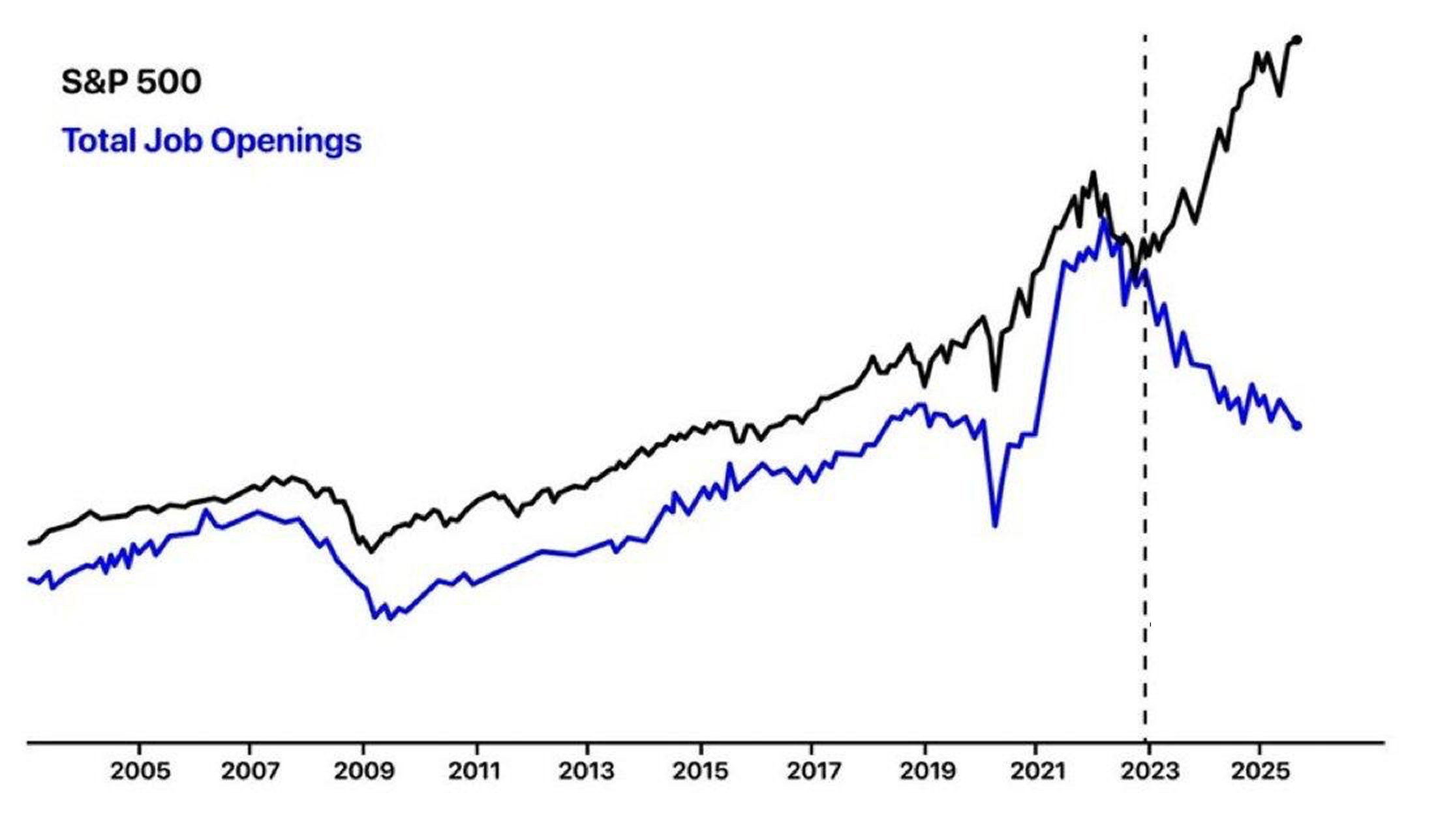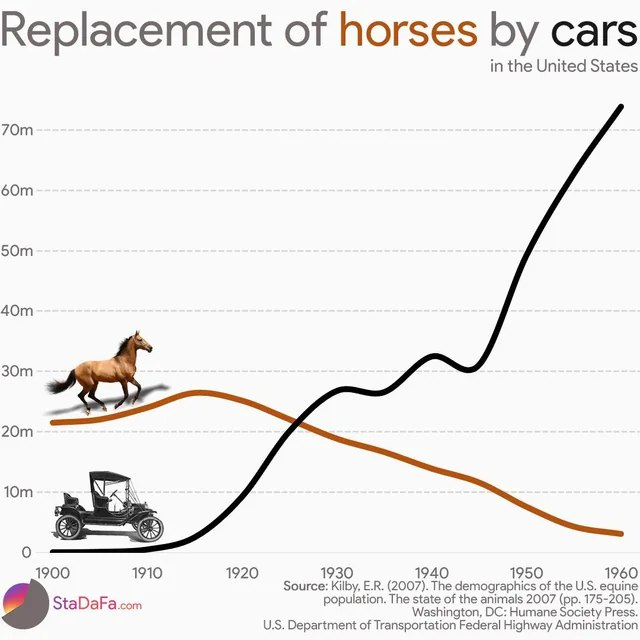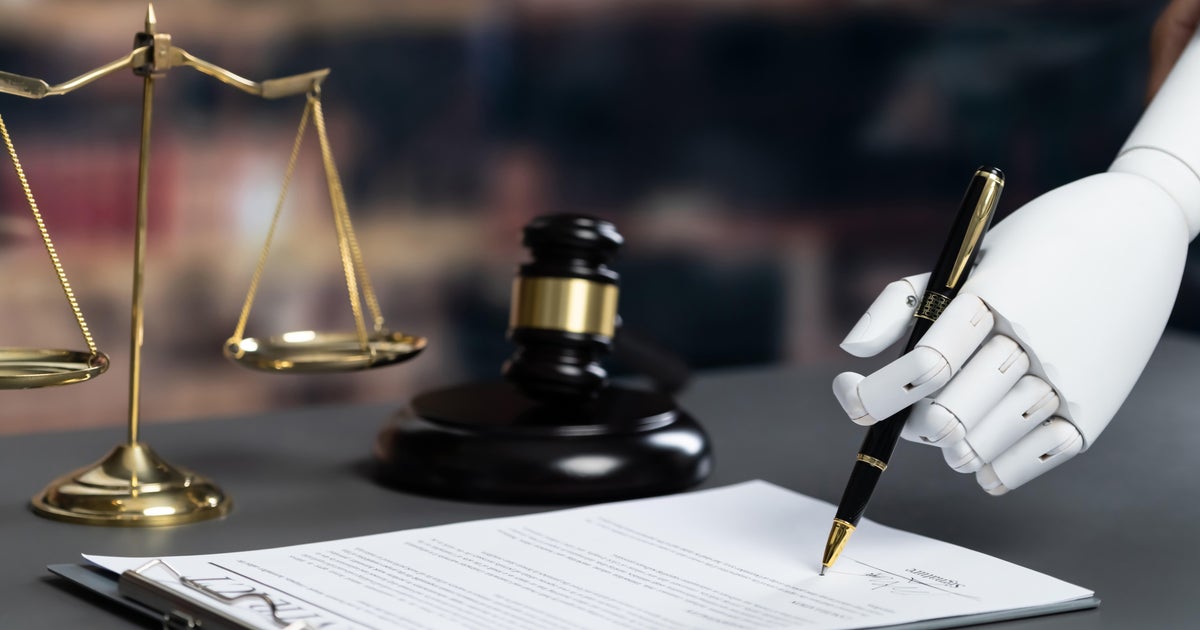
https://fred.stlouisfed.org/series/UNRATE
Update 2023-12-06:
I appreciate the discussion here, I know it's an ambiguous question and ultimately it's a judgement call, here's my best attempt at quantifying the intent:
This only resolves Yes if AI increasing worker productivity or taking over people's jobs is directly responsible for at least 3 percentage points of the unemployment rate. If unemployment rate spikes due to something else and then the jobs don't come back because AI takes them over, that counts. I will use sober economic analysis to judge this, and wait at least 6 months after a spike to wait for better data before resolving Yes.
People are also trading


glue factory 2: electric boogaloo
@AdamK Technically yes, but since this is fairly short term as far as macro-economics trends go, it shouldn't matter too much. Also, it can resolve early, so any initial spike in automation leading to unrecoverable job loss will do it, even if something like GMI/UBI causes most unemployment to turn into labor non-participation relatively quickly.
TechCast Global's study on AI's impact on jobs offers a "Muddling Through Scenario" as the most probable, combining new creative jobs and Guaranteed Minimum Income (GMI) to manage a modest 3% rise in unemployment to 11% by 2030. Expert consensus predicts stability in complex manual-social jobs (18%), a 22% reduction in routine jobs, stable service/knowledge jobs (31%), an 11% gain in creative work, an 8% introduction of GMI, and 11% traditional unemployment. Alternative scenarios include a "Higher-Order Growth Scenario" envisioning a boom in creative jobs and an "Unemployment Crisis Scenario" foreseeing a significant employment crisis due to rapid automation.
In the USA in 2023, AI will have a variety of effects on the job market. It's generating new job prospects in manufacturing, retail, transportation, healthcare, and AI development. By automating monotonous chores, this technology is also improving current jobs, leading to higher levels of productivity and job satisfaction. Artificial Intelligence is enabling the emergence of new businesses that could create millions of employment, such as self-driving automobiles. But since AI has the potential to replace some jobs, humans must adapt by picking up new, in-demand skills. By 2030, Forrester projects that AI will add 11 million new jobs to the US economy, replace 2.2 million existing ones, and create 2.4 million new positions. To prepare the workforce, the US government is investing in AI education and training. Although the precise effects of AI on employment will vary by industry, overall employment trends are predicted to be favourable, with more jobs being created than being eliminated.
@AltamashShaikh Hi Altamash, I agree on your comment but consider there exists more data and statistics to demonstrate why unemployment in US rate will not even reach 10% due to AI. Firstly, there has been only 3 moments in history where US unemployment rate has reached 10% or higher: 1982, 2009 and 2020. The three of them have happened in strong economic crisis and none of them due to the creation or discovery of new technology. The creation of new technologies has always increase labor productivity dramatically and enhance a shift in labor market, but not a downturn. A study from McKinsey states that even though some types of jobs will be automated, generative AI will enhance the way STEM, creative, and business and legal professional work. It also states, that by 2030, productivity in US will increase by 0.5 to 0.9 percentage points annually.
How specific is the phrase "AI cause" here, and how will it be judged?
As long as AI is widespread and legal, any significant increase in unemployment is going to have some people attributing it to AI. If the mainstream media reports on those people, is that sufficient for a YES resolution?
If AI is one of several causes of an unemployment spike over 10%, but is judged by sober economists to have caused just a small portion of the spike (as in Andrea's link below), is that sufficient for a YES resolution?
If there is a spike over 10%, how long would you wait for the analysis by sober economists, or would you default to common reporting at the time of the spike?
The concern of artificial intelligence (AI) causing unemployment rates to exceed 10% in the United States is valid, as recent data indicates its impact on the job market. In a single month, AI contributed to nearly 4,000 job losses, and in May, announced job cuts surpassed 80,000, signifying a 20% increase from the previous month and a fourfold surge compared to the previous year. AI was responsible for approximately 5% of these reductions, ranking as the seventh-largest contributor to job losses in May 2023.
Nevertheless, there are reasons for optimism regarding job creation over the next six years despite concerns about AI-driven unemployment. Multiple studies support the idea that AI, despite its automation potential, can generate employment opportunities and increase productivity. Research examining the relationship between AI, machine learning, and data science in technologically advanced countries revealed a negative correlation between AI and unemployment, indicating its "displacement effect." This implies that AI can replace certain job roles while simultaneously creating new ones.
Historically, it's not the first time something similar has happened. It occurred with computers and during the Industrial Revolution. The introduction of mechanization and automation initially led to job displacement in traditional industries. However, as the economy adapted and new sectors emerged, employment opportunities rebounded, demonstrating the historical pattern of technological disruption followed by job creation.
Furthermore, countries like Singapore and Canada are actively addressing AI-related job creation by supporting the adoption of advanced technologies among SMEs and investing in workforce training programs. These initiatives aim to enhance efficiency and create jobs in the technology sector, contributing to a more positive employment outlook.
Considering the available data, research, and these proactive measures, it seems less likely that AI will push unemployment rates above 10% within the specified timeframe. This perspective is based on proactive measures and education that will assist the workforce in adapting to the evolving job landscape.
https://www.cbsnews.com/news/ai-job-losses-artificial-intelligence-challenger-report/
https://www.sciencedirect.com/science/article/pii/S2590051X23000308
The unemployment rate will decline in the US by 2030. More people will get employed as this happened previously during the introduction of computers. There was a lot of fear about people losing jobs, but it created more opportunities. Maybe, new skills are required for the new job market that's gonna come up in 2030 but there will be definitely more jobs and more employment coming up and things will get much simpler with the increase in AI software out there which means productivity will increase and more work could be done in less time. It is an ambiguous claim but humans are far more intelligent and superior to AI collectively and they will definitely figure out something far more advanced which in turn will create more job opportunities.
@ahalekelly This seems hard to call! What if Covid-26 causes unemployment to spike above 10% but then the jobs mysteriously don't come back afterward? Also what if Covid-26 turns out to have been synthesized with AI assistance but not completely by an autonomous AI?
